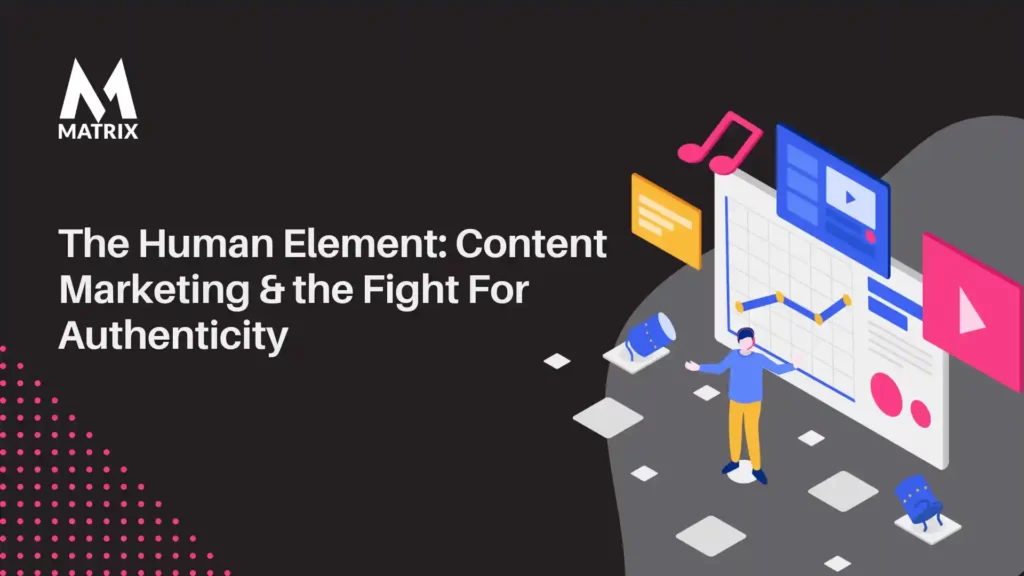The human element in content marketing is getting lost in writing tools like Grammarly and AI.
Internet literacy has become a bit of a double-edged sword for online businesses.
On the one hand, more people are entering the online space, which has assured a steady stream of potential customers for selling their products or services online to try and draw the eye.
On the other hand, it has created a situation where businesses can no longer rest on trying and true marketing methods to their consumer base without quickly seeing through their tactics.
This, coupled with a lingering distrust of online platforms, has turned authority and authenticity online into a cracked bottle, spilling out its contents as quickly as it can be filled up again.
People have trouble trusting online businesses, especially when they share sales tactics with websites that have more than earned that nervous hesitation from customers.
So, is there a way to maintain a trustworthy online presence?
That’s where content marketing comes in. In a world where more obvious optimization tactics will often get you marked as spammy or dubiously inauthentic.
Content marketing is the human element of your marketing strategy, creating something meaningful for your clientele to connect with as they explore your services.
What is Content Marketing?

As you’d likely guess from the name, content marketing is using various forms of content to promote a brand, either directly as PR pieces or targeted advertising or through indirect means, such as blogging or link building.
However, if it were that simple, we wouldn’t have another thousand words of explanation.
Alas, while content marketing may seem the simplest thing in the world, it encapsulates more than just quick sales pitches and promotional articles.
Content & the Nature of the Internet
When you get down to its most basic practical elements, what IS the internet? Although I’m sure that there are limitless possibilities when trying to answer that admittedly rather vague question, I would posit this:
The internet is, at its core, content connected by links.
Youtube is video content connected to other video content through an algorithm of links and suggestions based on your interactions with those links and pieces of content.
Google is an attempt to provide value scores to the near-limitless sea of content and links on the internet.
Even a platform like Twitter is just a jumble of ideas through text, videos, and pictures linked by some great algorithmic force.
When broken down into its core components, practically any website will be a structured mess of links and content, mostly text.
Because of this, many of how these links and pieces of content are categorized are based on text.
You can see why content marketing is far more all-encompassing than some would give it credit for. Your content is how the internet works out what you are, and the same can be said for the humans reading it.
Content, Brands & the Nature of Human Beings
As oddly dystopian as that heading seems, I feel that it’s an apt way to look at why we use content and why the internet is structured in the way it is.
Content has an enormous impact on how people interact with a product or service, with several studies across the 21st century finding that people develop genuine attachments to their favorite brands.
A paper from 2011 named Emotional Brand Attachment and Brand Personality: The Relative Importance of the Actual and the Ideal Self, for example, looks into some of the various factors that determine the emotional relationship that people will develop with brands and the effect that matching a brand’s personality with the customer’s “self” can have.
As marketing specialists, we are, to an extent, taught to write in the voice of our target audience.
Our brands are constructed to have an identity that allows them to connect with their audience on a level above simply appreciating their service. This is especially true on the internet.
The internet does away with many of the trappings that come with geographical convenience, meaning that for every service, product, or even business, there are likely thousands of competitors doing the same thing that are vying for the attention of the same audience.
If your service itself doesn’t come with unique selling points that will lure in customers over your competitors, then it’s up to you to give them a reason to come outside of that. If that can’t come in the form of quantifiable improvements.
You’ll need to try and connect with an audience emotionally. Heck, even if your brand DOES have quantifiable unique selling points over all of your competitors, good luck trying to convince them of that without some good branding and excellent content marketing.
All of this is to say that your content is your way of connecting with your audience, and connecting with them is the most important thing for any customer-facing business.
So, How Do You Do Anything With This Information?
If you’ve come this far and are scratching your head wondering how any of this helps you, I appreciate you staying on this long, and I’ll try to keep it worthwhile.
Content marketing, as you would expect, requires a lot of supplemental content to discuss without falling into flowery prose properly, so it’s important that there is a solid basis for any information that you try and implement yourself.
So, now that all of that has been covered, let’s get into the actionable points of all this:
Creating an Authentic Brand Tone & Identity

With all we have already covered, I would like to believe that the value of creating a brand identity is relatively obvious. It’s the proverbial face to a name for your customers, allowing them to easily recognize you in a sea of similar businesses.
So, when thinking about building a brand, it’s important to consider who you’re trying to appeal to. Therefore:
Audit Your Brand with Human Element in Content Marketing Considerations
You may think you know who your customers are, but your initial intention isn’t always going to match how your brand ends up interacting with them.
Nike started as a producer of track running shoes and is now most associated with flex wear and basketball; being able to pivot from your initial ideas where necessary is one of the most important factors in the longevity of a brand.
See who is currently interacting with your brand. Get information on demographics and traffic to your website from tools like SEMRush; the more information you have, the better your targeting.
Once you understand who you’re marketing toward, it’s time to do your research.
Get Inspired
One of the easiest trappings to fall into is only drawing information from competitors.
This is because, while competitor research is valuable, it’s difficult to stand out if you’re only drawing from what big businesses in your industry are already doing.
Instead, broaden your efforts, and look at businesses that are successfully appealing to the same demographics as you.
Get a feeling for their tone, style of writing, and visual identities, and try to pinpoint the throughlines between them all; find what commonalities they tend to share.
Find Your Identity with Human Element in Content Marketing Considerations
It’s important to bring something unique to the table, and what’s more unique than you?
Even if you don’t feel that you are an overly engaging presence, the authenticity of having a defined human presence is invaluable in and of itself.
People want to connect with people, so having your personality seep into your brand’s identity is a great way to get people to identify with your offerings.
To be clear, this doesn’t mean parading your face across billboards like Clive Palmer. It simply means allowing your personality to come through in your writing, aesthetics, and interaction with your customers.
Nobody wants to feel like they are being palmed off by someone else when they try to ask for help or like the words they’re reading were spun by artificial intelligence.
Authenticity means showing that someone who cares about their customers has a hand in this business.
Remain Consistent in Your Tone & Messaging

As with people, businesses change over time. This natural progression of ideas as a brand shifts from one message to another is natural, and the ability to do so when necessary is hugely valuable.
However, inconsistent messaging, where you appear to go between ideas one after the other that contradict each other, even just tonally, can completely derail a business’s success.
Consistency is one of the core pillars of authenticity.
If you believe in your tone and what you say through your content, marketing is coming from an earnest place. It shouldn’t change too drastically back and forth, whether on a whim or the back of some change in the world you would like to piggyback off of.
Once you have made a stance, it can be very difficult to back out of if you decide that you no longer want that to be your brand association, so do your best to consider whether the things you say and the way you say them are something you want your brand to be connected to.
Try to Make Friends and Play Nice
There are many reasons why some businesses hire people to handle client and competitor interactions.
For some, it’s simply because they don’t have time. For others, it’s because they don’t have the innate understanding of social and other platform varieties required to get the most out of their efforts.
However, many people do this because they know they should not interact directly with the public.
Being a spokesperson is a skill in and of itself, and if you don’t think you can keep your temper or avoid speaking out of turn, hiring someone else to do it for you is an admirable and adult decision (good job to those that have taken this particular path).
However, for those who have decided they don’t need anyone to speak in their place, you must understand why people often do.
The internet can be difficult to navigate when you’re at in the public eye. It can feel like scrutiny is everywhere, and anything that you say or do will forever be weaved into the proverbial tapestry that is your online historical presence.
Because of this, maintaining a clear head and avoiding unnecessary hostility is essential if you want to maintain an uncomplicated relationship with those utilizing your services.
One must only look so far to find countless stories where successful people have been stripped of their standing due to a poorly worded “joke” or bigoted remark.
So, if you can’t keep things like that out of your online presence and branding, it’s best to hire someone who can.
Connecting to people through the internet can be difficult, especially when building a brand.
However, those willing to put in the work and acknowledge the importance of that connection are sure to reap the benefits.
A brand can be so much more than a business; once it sticks in people’s minds, it can become a little piece of their identity.
If you want to reach that point, it’s up to you to convince your audience that they should let you into their lives, which is difficult to do with products alone.
Human Element in Content Marketing Summary
We’re listening.
Have something to say about your thoughts on the human element of content marketing?
Share it with us on Facebook, Twitter, or LinkedIn.
General FAQs’s the human element for content marketing
What is the human element?
The Human Element is the innate skills, talent, emotion, drive, and culture that only come from humans.
How does the human element impact marketing content?
Companies focus all their energy on the technicalities that foster growth and success: maximizing conversion rates, search engine optimization, profitability, reach, etc. While all these are valuable and essential elements of running a business, their potential impact is limited when not partnered with a strategy that values the human element of doing business. Any business’s consumers are people who long to feel seen, engaged, valued, and appreciated.
Why are human elements important?
Every part of your business bubbles down to people. And by understanding the human element, you’ll be more profitable, lead more effectively, create brand loyalty, close more deals, and do better work.
What is the human element of a digital marketing agency?
The Human Element is a holistic and comprehensive methodology for improving how people work together, leading to better individual, team, and organizational performance and rate of goal achievement. The Human Element aims to reduce unproductive behaviors and achieve better business results. That’s what MATRIX is all about!

